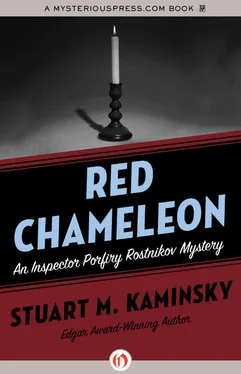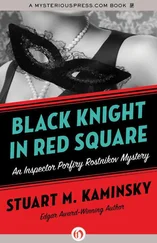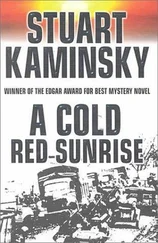Stuart Kaminsky - Red Chameleon
Здесь есть возможность читать онлайн «Stuart Kaminsky - Red Chameleon» весь текст электронной книги совершенно бесплатно (целиком полную версию без сокращений). В некоторых случаях можно слушать аудио, скачать через торрент в формате fb2 и присутствует краткое содержание. Год выпуска: 2012, ISBN: 2012, Издательство: MysteriousPress.com/Open Road, Жанр: Полицейский детектив, на английском языке. Описание произведения, (предисловие) а так же отзывы посетителей доступны на портале библиотеки ЛибКат.
- Название:Red Chameleon
- Автор:
- Издательство:MysteriousPress.com/Open Road
- Жанр:
- Год:2012
- ISBN:978-1-4532-6632-8
- Рейтинг книги:4 / 5. Голосов: 1
-
Избранное:Добавить в избранное
- Отзывы:
-
Ваша оценка:
- 80
- 1
- 2
- 3
- 4
- 5
Red Chameleon: краткое содержание, описание и аннотация
Предлагаем к чтению аннотацию, описание, краткое содержание или предисловие (зависит от того, что написал сам автор книги «Red Chameleon»). Если вы не нашли необходимую информацию о книге — напишите в комментариях, мы постараемся отыскать её.
Red Chameleon — читать онлайн бесплатно полную книгу (весь текст) целиком
Ниже представлен текст книги, разбитый по страницам. Система сохранения места последней прочитанной страницы, позволяет с удобством читать онлайн бесплатно книгу «Red Chameleon», без необходимости каждый раз заново искать на чём Вы остановились. Поставьте закладку, и сможете в любой момент перейти на страницу, на которой закончили чтение.
Интервал:
Закладка:
“Good afternoon,” Rostnikov said amiably in English. “I am Chief Inspector Porfiry Petrovich Rostnikov, I do not know what name you are registered under, but you are Mikhail Posniky.”
The younger man, a burly figure, very much the way Sofiya Savitskaya had described him, started to rise, his eyes looking about.
“Sit down, Martin,” the old man said in English, taking a sip of his wine. “We’re in the middle of Moscow. Where are we going to run to? “
“May I sit?” Rostnikov said, still in English. “I have a bad leg. The war.”
“Sit,” said Posniky in Russian, and Rostnikov sat. Rostnikov could see a faint resemblance between this old man and the young one in the photograph. This man’s face was a dry landscape, a parched riverbed filled with crevices. “You like wine, chief inspector?”
“That would be nice.”
Rostnikov glanced at the younger man, who was looking around the room. His eyes stopped first on Zelach, then circled and found Tkach. If he panicked, Rostnikov was prepared to reach out and grab him. He looked trained, formidable, possibly even a challenge. Posniky’s very blue eyes came up and met Rostnikov’s.
“Don’t do anything stupid, Martin,” the old man said in English.
“Thank you,” said Rostnikov, accepting a glass of dark wine.
“The wine isn’t as I remembered it,” Posniky said, looking at this glass. “Has it changed that much, or have I?”
“It has changed,” said Rostnikov. “But you’ve been gone for a long time. If you would feel more comfortable speaking English …”
“More than sixty years,” Posniky said with a little smile. “I’ll try Russian, though my phrases may be a bit out-of-date and there are many words I’ve forgotten. I am over eighty years old. Do I look it?”
“I would have guessed sixty,” said Rostnikov, sipping the wine. It was awful.
“Let’s try-” Martin said, leaning forward, his voice urgent.
“Sit and do what you are told,” Posniky said with authority. Martin sat back and divided his attention between the three policemen in the room.
“The candlestick,” Rostnikov said. “You have a story. I would like to hear it.”
“I have a story,” the old man said. “Do we have time?”
“We have time,” said the detective, placing his half-finished drink on the table.
“In 1891-” he began. “You’ll forgive me if I go back that far. It might help you to understand the-how do you say, ugly?”
“Nekrasivyi,” said Rostnikov.
“Ah, yes,” said the old man, shaking his head at the memory of the word, “the ugly details. In the winter of 1891 the Gentile soldiers of the fonie, the czar, came to Yekteraslav for their quota of boys twelve and older who were to go for an indeterminate period, which the fonie forever varied from five to forty years. The longer the period of service, the more likely the boy to die or accept Christ, though Jewish boys had proved stubborn and deaths outnumbered conversions among Hebrew soldier children. It had been agreed that only one son would be taken for each family. According to my father, the Russian officer who came that day was a foolish man, a stupid man. He took who he wanted, which meant my father and his two brothers, one of whom was only eleven. My uncles died. My father came back in six years, half mad.”
Rostnikov nodded to show that he was listening, but the old man was not watching the policeman. He was holding his wineglass in both hands and watching the last drops as he spoke more to himself.
“My father was arrested in 1909 by an officer who came to the door in a blue coat and fur hat. I was only a few years old, but I remember my father, or-who knows? — my mother may have described him so often that I think I remember him. He was arrested because we had a local shopkeeper’s son working for us during the small harvest of our farm. The soldier at the door quoted the May Laws of 1881 stating that Jews could not hire Christian domestics without the express permission of the regional governor. The shopkeeper’s son was only half Christian; and we paid him only with a few vegetables. We had no money, but”-Posniky shrugged-“they took my father, and we never saw him again. … My father, the village lunatic.
“And now,” Posniky said, looking up with narrow eyes at the uneasy Martin, “and now ten years later, the Revolution. I was a boy. My friends were boys. Yekteraslav was an isolated Jewish village. We knew little of the Revolution. We didn’t know which side was which. Some said the Jews would be better off after the Revolution. Most of us didn’t believe it. Shmuel Prensky believed it. Abraham Savitskaya and I had lost too many relatives to the Christian Russia to believe it.”
“And Ostrovsky,” Rostnikov added, reaching for the bottle of wine. It was awful wine, but it was wine. “The actor.”
Posniky looked up warily, not quite startled. “It will be easier to tell my story if you let me know what you know so I don’t have to repeat-”
“I know names,” Rostnikov said, biting back a bitter sip. “I know events of the last days, the murder of Abraham Savitskaya by you and your companion, the theft of the candlestick.”
“It was no theft,” the old man said with some emotion. “It was mine. It was my mother’s. When the Reds came to our village in 1919 or 1920 to collect young men the way the fonie had collected our fathers, Abraham and I decided to get out. My mother and his gave us some food, and my mother gave me the candlestick. It was all she could give, and it was worth little. I said good-bye to my mother and sister, and we left on a winter morning. We were young, too stupid to see the uselessness of what we were trying, to get to Riga, to walk to Riga or steal a ride, but to get to Riga and get on a boat for Canada or America. We didn’t know about passports. We didn’t know that the few rubles in our pockets would buy not even enough bread for the trip. We assumed other Jews would help us on the way. We had names of friends of friends in towns along the way. We never found the towns or the friends. How much detail do you want, policeman?”
“As much as you wish to give,” said Rostnikov, checking to see that Zelach and Tkach were alert. Zelach, across the room, looked puzzled by the scene.
“When we got to the road leading out of town,” Posniky said, “we were too stupid even to go across the fields. We met two soldiers who had been left to stop just what we were doing. One was young. One was quite old. Their uniforms were makeshift, and they were surprised when we killed them. They expected docile young Jewish boys to run back into town, weeping. They had one horse between them, and both were standing on the ground, ordering us to turn around, when I pulled out the brass candlestick from my cloth sack and hit the young one in the face. His cheek gave way, and he tried to scream. I hit him again while the old soldier watched. Neither of them were real soldiers. The old one turned to run, but Abraham leaped on him, and I beat him to death, too. Since then, I have killed others.”
“Including Abraham Savitskaya,” said Rostnikov.
Martin was examining the faces of the two men across from him, trying to understand odd words in a foreign language, tense with frustration. Rostnikov was sure the young man would have to be dealt with before the afternoon was over.
“Including Savitskaya,” agreed Posniky. “We dragged the bodies into the gray weeds off the road, and we ran through the field, leaving the horse standing in the middle of the road. Neither of us even considered taking the horse.”
“Young boys often do very foolish things,” said Rostnikov.
“And old men,” added Posniky, holding up his glass, which Rostnikov refilled with wine.
Читать дальшеИнтервал:
Закладка:
Похожие книги на «Red Chameleon»
Представляем Вашему вниманию похожие книги на «Red Chameleon» списком для выбора. Мы отобрали схожую по названию и смыслу литературу в надежде предоставить читателям больше вариантов отыскать новые, интересные, ещё непрочитанные произведения.
Обсуждение, отзывы о книге «Red Chameleon» и просто собственные мнения читателей. Оставьте ваши комментарии, напишите, что Вы думаете о произведении, его смысле или главных героях. Укажите что конкретно понравилось, а что нет, и почему Вы так считаете.












